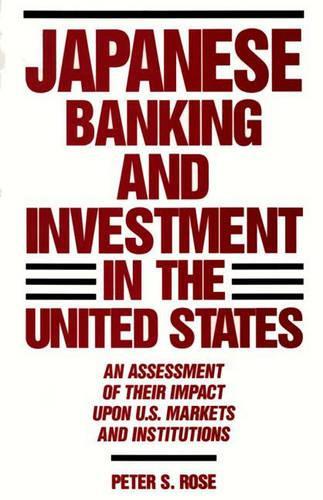
Japanese Banking and Investment in the United States: An Assessment of Their Impact Upon U.S. Markets and Institutions
(Hardback)
Publishing Details
Japanese Banking and Investment in the United States: An Assessment of Their Impact Upon U.S. Markets and Institutions
By (Author) Peter Rose
Bloomsbury Publishing PLC
Praeger Publishers Inc
30th October 1991
United States
Classifications
Tertiary Education
Non Fiction
Banking
Investment and securities
332.67352073
Physical Properties
Hardback
224
Description
This detailed examination of Japanese banking and investment activities in the United States offers a picture of both the causes of the recent growth of foreign investment activity and the consequences of this trend for American companies, households and government agencies. The author argues that multiple factors have shaped the growing roles played by Japanese banks in the US financial system and by Japanese investors in the US economy, but remains optimistic that this is not necessarily a cause for alarm. Among the causes of Japanese expansion discussed in the book are the rapid appreciation of the yen in international markets, Japan's large trade surpluses with the US, the high personal savings rate of the Japanese, periodically depressed US stock prices and the low barriers to entry into most US markets. Also detailed are the consequences of possible reductions in Japanese financial activity, which could be felt in the US through higher domestic interest rates, a reduction in the creation of new jobs, rising unemployment, reduced availability of long-term capital, and a slackening in the growth of US output.
Reviews
Rose has served with the Federal Reserve System and has authored several publications on finance. He evaluates the scope of Japanese banking and investments in the US; the links between Japanese and foreign banks; the organizational vehicles used by Japanese banks to enter American markets; the causes of Japanese financial expansion; their targeting of commercial customers and their advantages in corporate financing; and their expansion into US securities and real estate markets, including alliances between Japanese and US financial firms for mutual interpenetration. In his assessment, Rose covers the impact of Japanese financial presence on large US banks and on government deficit financing, the increasingly coordinated international standards of regulation, and the prospects of a decline in the volume of Japanese capital flows. The thought-challenging implications reaffirm US commitment to free trade and free capital movement. The book is factual, informative (in addition to its 44 tables), and is well organized. Recommended for graduate and all financial research collections.-Choice
"Rose has served with the Federal Reserve System and has authored several publications on finance. He evaluates the scope of Japanese banking and investments in the US; the links between Japanese and foreign banks; the organizational vehicles used by Japanese banks to enter American markets; the causes of Japanese financial expansion; their targeting of commercial customers and their advantages in corporate financing; and their expansion into US securities and real estate markets, including alliances between Japanese and US financial firms for mutual interpenetration. In his assessment, Rose covers the impact of Japanese financial presence on large US banks and on government deficit financing, the increasingly coordinated international standards of regulation, and the prospects of a decline in the volume of Japanese capital flows. The thought-challenging implications reaffirm US commitment to free trade and free capital movement. The book is factual, informative (in addition to its 44 tables), and is well organized. Recommended for graduate and all financial research collections."-Choice
Author Bio
PETER S. ROSE holds the Jeanne and John Blocker Chair of Business Administration at Texas A&M University and is Professor of Finance. He previously served as a Financial Economist with the Federal Reserve System, and has written several books, including The Interstate Banking Revolution: Benefits, Risks, and Tradeoffs for Bankers and Consumers (Quorum, 1990).
